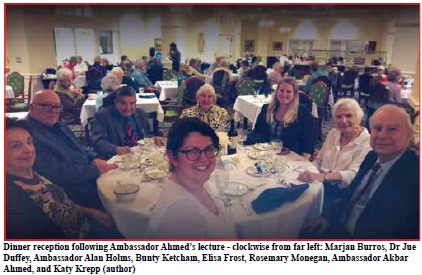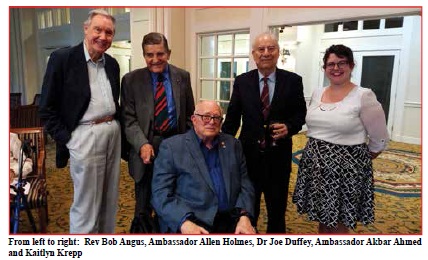“Never Too Old to Learn”
By Kaitlyn Krepp

The depth of talent and intellect in Washington, DC never ceases to amaze me. The diplomats, the scholars, and what I knew I would be able to learn is what drew me to DC in the first place. I was reminded of this yet again when I accompanied Ambassador Akbar Ahmed, former High Commissioner from Pakistan to the UK and Ireland and the current Ibn Khaldun Chair of Islamic Studies at American University, when he spoke to an overflowing room of retired senators, journalists, ambassadors and their spouses at Ingleside Rock Creek retirement home on a bright day in mid-September.
Distinguished guests included Rosemary Monegan, the former president of the Woman’s National Democratic Club; Marian Burros, an Emmy Award winner, food columnist for the New York Times, and author of a dozen cookbooks; Joe Duffey, the former president of American University; and Ambassador Allen Holmes, the former US Ambassador to Portugal, former professor at Georgetown, and our gracious host and coordinator for this event. Ahmed was the first Muslim scholar to speak at Ingleside and he was welcomed by the community with open arms.
After a warm introduction by Ambassador Holmes, Ahmed wasted no time getting into the hard-hitting issues that face Muslims around the world every day. He set the tone for the night’s focus on knowledge and education by reflecting that he only now feels as though he is beginning to learn about how much there is for him to learn, a direct reference to the scholar and philosopher Socrates, who said that the only thing he knows is that he knows nothing.
He recalled that on Sept. 11th, 2001 he had just begun teaching at American University and was wondering how he could make his students care about his subject focusing on Islam, when during class, just miles from AU, a plane hit the Pentagon. Suddenly, Islam was at the forefront of everyone’s mind and the issue was no longer getting his students to care about Islam, but rather to understand Islam. This was the catalyst that made him decide to gather a team of students and embark on a series of research projects to understand dynamics within and regarding Muslim societies so that he could expertly explain Islam and condemn terrorists for distorting it. These fieldwork projects examined the complexities of different Muslim communities and their relationship with the West. In addition to the pedagogical reasons, he saw this as an exercise in bridge building between faiths. These studies provided Ahmed many important insights into the nuances of Islam and how it’s practiced, but he emphasized that his understanding isn’t complete, which is why he is driven to continue conducting further studies and calls on others to help meet this continued need for scholarship.
After Ahmed had delivered his exceptional talk, the floor was opened for questions. Echoing Ahmed’s emphasis on education, the audience had questions about how to ensure that education had its intended impacts: What was the meaning of education? Were we teaching our children the wrong things? Ahmed reinforced their concerns about education by highlighting examples from his fieldwork in Spain for Journey into Europe, many respondents shared that in their schools, history is taught starting after 1492. While Americans may know that as the year that “Columbus sailed the ocean blue,” it’s also the year that Muslims and other non-Christians were systematically forced to leave Spain. This Europe-centric retelling of history completely eliminates all of the contributions that Muslims made to science, math, art, and so much more.
The final question of the night highlighted one of the most common misconceptions about Muslims. “Why doesn’t anyone speak out [against the violence and extremists]?” Without missing a beat, Ahmed responded, “Why aren’t those of us that are speaking out being heard?” The problem is that in the West, many people don’t recognize that educated Muslims that actively condemn violence and terrorism are the most highly targeted group by extremists, making it not just difficult but dangerous for a large contingency of Muslims to speak out. Ahmed then told the heart-wrenching story of his wife’s family to drive this point home. Five members of her extended family were vocal activists, one of whom had been the Minister of Education in Pakistan, were shot and killed by the Taliban; they were killed because they spoke out.
This was my first big event since joining the team as an undergraduate research assistant, and I wasn’t disappointed. As an undergraduate student at American University, I was very intrigued by all of the discussion about education. My biggest discovery was that my generation plays a central role in changing the direction of the country. I was struck by the general agreement throughout the crowd that the definition of education has morphed to become a means to an end and that the situation felt hopeless. Education has always been critically important to American identity, but since I was a child I was taught that you have to go to college so that you can get a good job; I was never told to go to college because I love learning. It wasn’t until this discussion that I realized that there was a shift that had occurred at some point. This evening really made me reconsider what my motivations were to leave Ohio 4 and come to DC for college. While of course I want a good job after graduation, I also am in classes that teach me about what I love. My peers and I, as young people, need to recognize our importance in society and start taking our education seriously -- not for our personal gain, but for society’s.
I’m always impressed with how astutely Ahmed is able to tap into the greater issues facing society, and in the case of this lecture he very accurately reflected the problems within the educational system used throughout the West. The residents of Ingleside were just as impressed by Ahmed’s talk as I was. In an email titled “Your Superb Friday Lecture,” Holmes said:
“The rave reviews are still streaming in about your inspiring presentation from countless residents. They admired your command of the subject, your stimulating thoughts on the challenges facing us today, and they also appreciated your taking the time and trouble to give us such an erudite presentation.”
Later, President Duffey reflected that the event was “absolutely stunning.” I have to agree. The event was beautiful and the message of continued engagement in the community was clear. I look forward to accompanying Ahmed to many more events in the coming years and helping to play a role in bridge-building and increasing cross-cultural understanding.
I think the event was so successful because everyone in the audience could relate to Ahmed and shared his passion for learning. After the evening had ended, Holmes was seeing us to our car with the old world courtesy of a consummate diplomat. He thanked Ahmed again for coming to speak and left us with a valuable reminder throughout life: that people are “never too old to learn.”

-----------------------------------------------------------------------------

